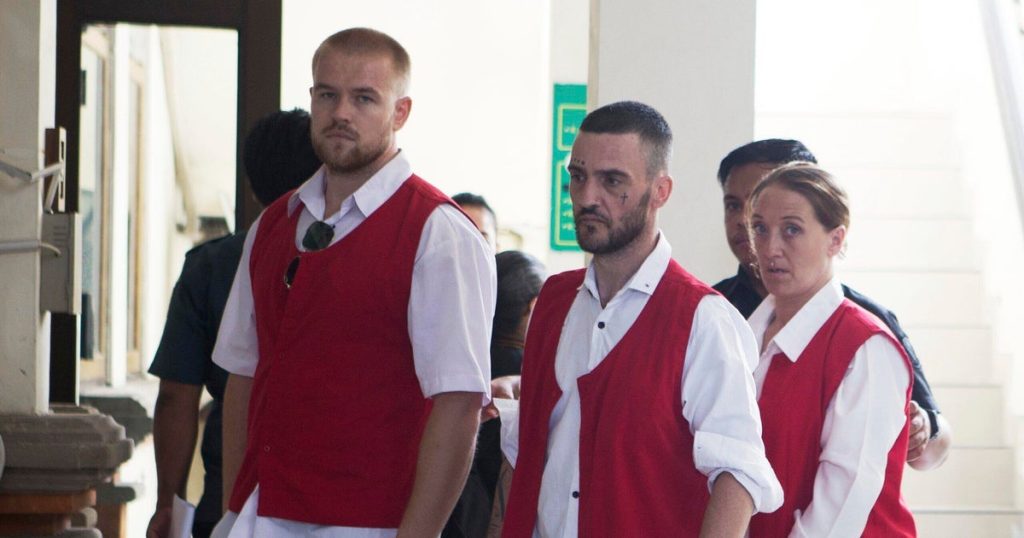Three British nationals, accused of smuggling over two pounds of cocaine into Indonesia, are facing serious legal consequences after being charged on Tuesday in a Bali court. With the potential for the death penalty looming due to the nation’s stringent drug laws, the situation has garnered significant attention. The trio has a history of prior successful smuggling attempts, raising concerns about international drug trafficking networks targeting Indonesia.
| Article Subheadings |
|---|
| 1) Arrest and Charges Filed |
| 2) Evidence of Drug Smuggling |
| 3) Previous Smuggling Attempts |
| 4) Legal Proceedings and Potential Sentencing |
| 5) Broader Implications of Drug Trafficking in Indonesia |
Arrest and Charges Filed
On February 1, customs officials in Bali apprehended Jonathan Christopher Collyer (28) and Lisa Ellen Stocker (29) after they flagged suspicious food package contents during an inspection at X-ray machines. Prosecutor I Made Dipa Umbara revealed during the arraignment at the Denpasar district court that both were charged with drug smuggling, which carries severe penalties including the death penalty. The legal process has unfolded under the strictest of Indonesia’s stringent drug laws, known for their harsh implications on drug-related crimes.
Evidence of Drug Smuggling
Investigators confirmed that the content of the couple’s luggage contained 2.19 pounds of cocaine disguised within ten sachets of Angel Delight powdered dessert mix. The significance of this specific choice of concealment illustrates the lengths to which smugglers will go to evade detection. The courtroom proceedings highlighted this shocking discovery, which underscores the toilsome efforts of Indonesian authorities against drug trafficking. Umbara noted that authorities undertook the prosecution based on solid forensic laboratory analyses of the evidence presented.
Previous Smuggling Attempts
According to reports from the Bali Police Narcotics Unit, the group had successfully smuggled cocaine into Bali on two prior occasions, showcasing their systematic approach to trafficking. After the recent arrests, police subsequently detained a third suspect, Phineas Ambrose Float (31), who was implicated in the drug transfer during a controlled delivery orchestrated by law enforcement. This recurring pattern emphasizes the operational networks that engage in drug smuggling, taking advantage of Indonesia’s position as a transit point between various global locations.
Legal Proceedings and Potential Sentencing
The District Court in Denpasar will reconvene on June 10 to consider witness testimonies regarding the case. Legal representatives of the suspects remained tight-lipped after the charges were read. Defense attorney Sheiny Pangkahila previously stated that, pending conviction, the defendants might face sentences ranging from 15 to 20 years, with the death penalty as a grim possibility. The seriousness of the Indonesian judicial system regarding drug offences necessitates that individuals understand the high stakes involved in such illicit activities.
Broader Implications of Drug Trafficking in Indonesia
Indonesia is known for having one of the most severe stances worldwide on drug-related offenses, evidenced by the high number of inmates on death row. Official figures indicate that approximately 530 individuals are awaiting execution, primarily for drug offenses. This environment reflects a nationwide effort to deter drug trafficking activities, especially with international criminal syndicates increasingly targeting Indonesia’s vulnerable youth. As Prabowo Subianto‘s administration has begun addressing the issue of extraditing foreign inmates to their countries, this case raises alarms about both national security and the global implications of drug trafficking.
| No. | Key Points |
|---|---|
| 1 | Three British nationals were charged with drug smuggling in Bali. |
| 2 | Cocaine was concealed in food packaging, valued at approximately $368,000. |
| 3 | The group had successfully smuggled drugs on two previous occasions. |
| 4 | If convicted, defendants may face 15-20 years or the death penalty. |
| 5 | Indonesia’s strict drug laws reflect broader global challenges with drug trafficking. |
Summary
The arrest and charges against the three British nationals for cocaine smuggling highlight critical issues regarding international drug trafficking and Indonesia’s stringent legal framework designed to combat this phenomenon. With the potential for harsh penalties, the case serves as a stark reminder of the serious repercussions faced by those involved in illicit drug activities. The unfolding trials will not only determine the fate of the accused but also reinforce Indonesia’s image as a decisive player in the global fight against drug-related crimes.
Frequently Asked Questions
Question: What are the penalties for drug smuggling in Indonesia?
Drug smuggling in Indonesia can lead to severe penalties, including lengthy prison sentences or the death penalty, depending on the amount and type of drug involved.
Question: What is the role of the Indonesian legal system in drug offenses?
The Indonesian legal system is known for its strict enforcement of anti-drug laws, reflecting the country’s zero-tolerance policy towards drug trafficking and abuse, resulting in severe penalties for offenders.
Question: How does international drug trafficking affect Indonesia?
International drug trafficking poses significant challenges to Indonesia, leading to high numbers of drug-related offenses and a substantial population on death row, further complicating national security and public health issues.
